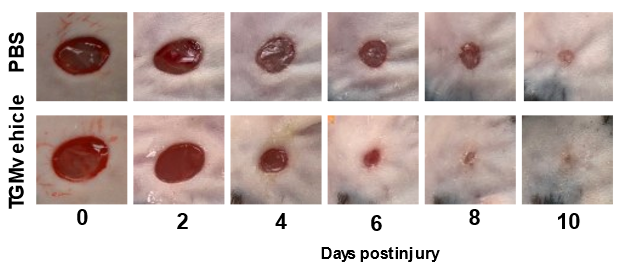
Treatment of wounds with TGM shows improved recovery compared to control group in a span of 10 days.
Invention Summary:
Helminths are potent modulators of immune function capable of stimulating an immune response that includes significant wound healing effector functions. Effective wound repair requires both the direct reconstruction of the injured tissue and suppression of pro-inflammatory responses. In addition, “scar tissue” formation during wound healing must be prevented.
Scientists from Rutgers University and the University of Glasgow developed a novel therapy for treatment of cutaneous wounds using a helminth-derived TGFβ mimic (TGM) protein. In vivo studies demonstrate that TGM application onto wounds favors pro-regenerative wound healing characteristics, including re-epithelialization, collagen crosslinking, and hair follicle regeneration. Furthermore, skin wounds treated with TGM showed reduced scar tissue formation and associated fibrosis compared to control groups. In addition to accelerating wound healing and reducing scar tissue formation, the composition and method can also be used to treat skin disorders associated with pathological increases in fibrotic tissue formation in a subject, such as psoriasis and acne. With the broad range of applications of this novel compound, along with it being suitable for a range of modes of delivery, this technology holds promise to develop novel approaches for skin wound healing.
Market Applications:
- A wound dressing or treatment for open wounds on the skin.
- A wound dressing or treatment for wounds inflicted on the skin, such as eczema, psoriasis, and cutaneous mastocytosis.
Advantages:
- Reduces scar tissue formation
- Restores mechanical properties of normal tissue
- Improves tissue regeneration, regrowth, and restoration
Intellectual Property & Development Status: Issued US patent # 9,931,361 B2. Available for licensing and/or research collaboration, along with issued patent US 11,866,467 B2 & pending patent EP 3,661,952 A1 owned by the University of Glasgow. For any business development and other collaborative partnerships, contact: marketingbd@research.rutgers.edu
Supporting Documents/Publication: